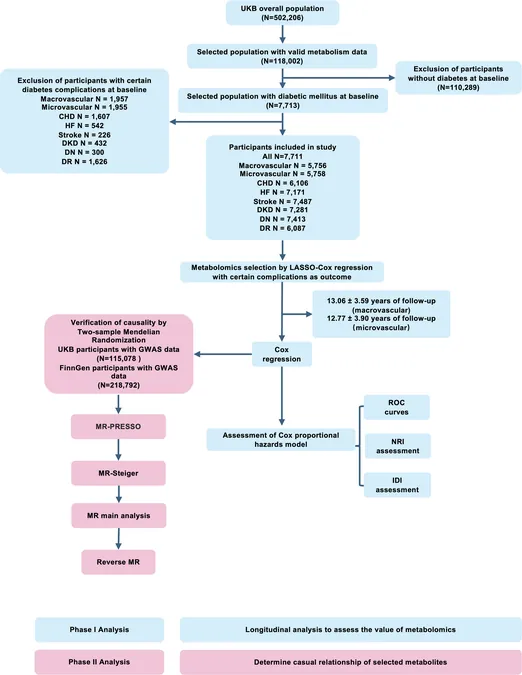
Unlocking the Secrets of Diabetes: New Metabolic Biomarkers for Vascular Complications
2025-08-18
Author: Jia
A Game-Changer in Diabetes Research
Metabolic imbalances have long been recognized as a driving force behind diabetic vascular complications, yet the potential of plasma metabolites has remained largely unexplored—until now. Recent groundbreaking research aims to redefine our understanding of how circulating metabolites can forecast the onset of these complications, providing critical insights into diabetic patient care.
The Research Landscape
Involving a colossal sample of 333,870 participants from the UK and Finnish Biobanks, this transformative study meticulously profiled 249 plasma metabolites among 7,711 diabetic patients. By employing high-precision nuclear magnetic resonance (NMR), researchers identified specific metabolites linked to both macrovascular issues, like heart failure and stroke, and microvascular problems, including diabetic neuropathy and kidney disease.
Key Findings That Could Change Lives
Over an average follow-up period of over 13 years, the study uncovered that 15 metabolites correlated significantly with macrovascular complications, and 33 with microvascular complications. Key metabolites such as creatinine and glucose emerged as powerful prognostic indicators, demonstrating their potential to predict patient outcomes. For instance, elevated glucose levels increased the risk of microvascular complications, while high creatinine was linked to macrovascular issues.
Decoding the Danger: A New Model for Prediction
Harnessing advanced statistical methods like LASSO-Cox regression and multivariate Cox models, the findings revealed that certain metabolites could enhance predictive accuracy for complications, with AUC scores improving significantly. This means that integrating metabolomics into traditional risk assessments may allow for remarkably better patient management strategies.
Implications for Future Clinical Practices
As diabetes continues to pose a monumental global health challenge, identifying these biomarkers offers hope for early intervention and tailored treatment approaches. This could drastically enhance the quality of life for millions of people afflicted by diabetes, emphasizing the urgent need for the healthcare community to embrace metabolic profiling as a core component of diabetes management.
Genetic Insights and Causal Relationships
Additionally, Mendelian randomization analysis underscored the potential genetic links between these metabolites and diabetic complications, confirming a causative relationship. Notably, the phospholipid ratio in low-density lipoproteins (LDL) was identified as significantly increasing the risk of coronary heart disease.
A Call to Action for Healthcare Providers
The revelations from this investigation spotlight an imperative for clinicians to explore the metabolic landscape of diabetes more deeply. By embracing these innovative biomarkers, healthcare professionals can create more effective, personalized treatment plans that transform lives. With diabetes prevalence projected to skyrocket, here lies an opportunity to reshape the future of diabetes care.
Towards Comprehensive Diabetes Management
These findings reinforce the necessity of a multifaceted approach to diabetes research and treatment, highlighting the interplay between metabolic pathways and vascular health. As studies continue to evolve, the integration of metabolomics not only promises improved predictive capabilities but also a new frontier in understanding diabetes and its devastating complications.
Conclusion: A New Era in Diabetes Research
With the findings from this research reverberating through the medical community, it's clear that the road ahead is paved with possibilities. By unlocking the secrets held within plasma metabolites, we may soon turn the tide in the battle against diabetes and its associated vascular complications, ushering in a new era of personalized medicine.



 Brasil (PT)
Brasil (PT)
 Canada (EN)
Canada (EN)
 Chile (ES)
Chile (ES)
 Česko (CS)
Česko (CS)
 대한민국 (KO)
대한민국 (KO)
 España (ES)
España (ES)
 France (FR)
France (FR)
 Hong Kong (EN)
Hong Kong (EN)
 Italia (IT)
Italia (IT)
 日本 (JA)
日本 (JA)
 Magyarország (HU)
Magyarország (HU)
 Norge (NO)
Norge (NO)
 Polska (PL)
Polska (PL)
 Schweiz (DE)
Schweiz (DE)
 Singapore (EN)
Singapore (EN)
 Sverige (SV)
Sverige (SV)
 Suomi (FI)
Suomi (FI)
 Türkiye (TR)
Türkiye (TR)
 الإمارات العربية المتحدة (AR)
الإمارات العربية المتحدة (AR)